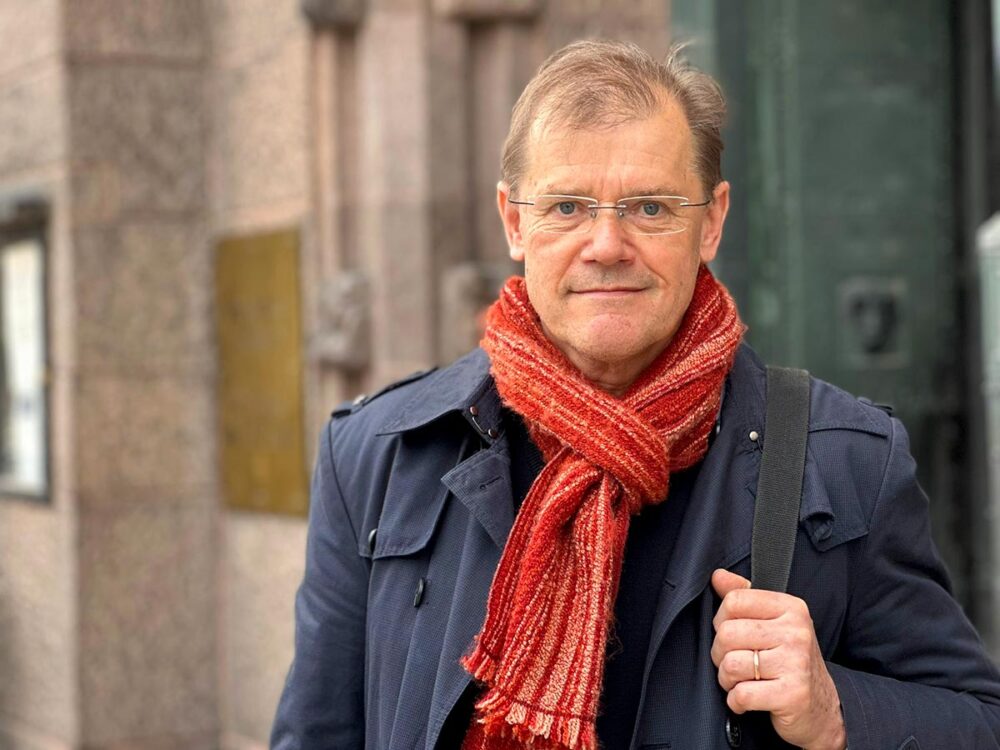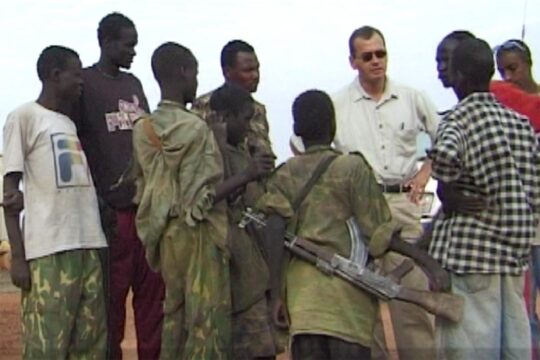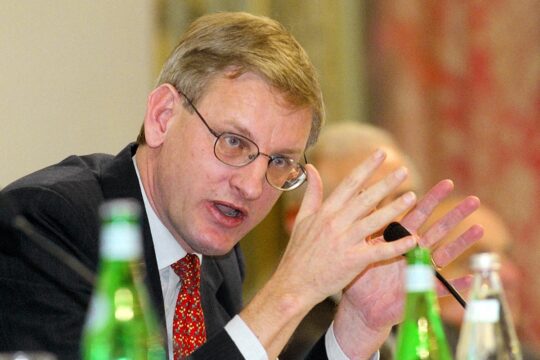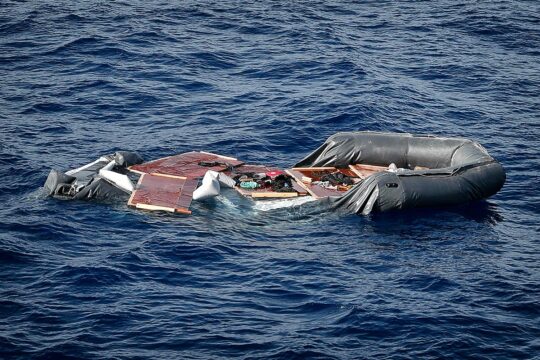The war crimes trial held in Stockholm against Swedish executives of the oil company Lundin operating in Sudan - the longest and most complex trial in the country’s history - has produced no shortage of dramatic testimonies.
But few witnesses have been as central, and as contested, as Egbert Wesselink. A Dutch peace activist and longtime senior policy advisor at the non-governmental Dutch organization PAX, Wesselink is perhaps best known as the driving force behind the 2010 report, Unpaid Debt, which argued that tens of thousands of civilians were killed or displaced as a direct result of oil exploration in Sudan. A report that, prosecutors say, laid the foundation for the entire trial.
So, on the day Wesselink testified, the courtroom was packed. Human rights activists, journalists, researchers, and diplomats came to see the man described by the defence as the “architect” of the case. For many, this was a moment of vindication. For others, it was an opportunity to challenge the credibility of a civil society investigation, now repurposed as legal evidence.
Lundin’s “genuine ignorance and deliberate disregard”
The first oil company Wesselink tried to influence was Shell, and he describes “an intense but structured dialogue” with its executives. When Shell became involved in Sudan, the country also ended up on his desk. “This led to Shell withdrawing its business operations from Sudan,” says Wesselink, explaining how they approached the company through both open conferences and closed-door meetings to inform them of the risks of working in Sudan.
According to him, there are a range of dilemmas faced by anyone working in Sudan. Most of the corporate executives he met acknowledged the existence of “grey areas and challenges”. “But Lundin’s CSR [Corporate Social Responsibility] representative, Christine Batruch, stood out. She saw no problems and showed very little interest in the human rights situation,” says Wesselink, arguing that she had been influenced by the Sudanese government’s propaganda.
One piece of evidence for this, Wesselink claims, was that she “ignored the reports of forced displacement and abuses”. “When I brought up issues that I considered to be common knowledge, it created an uncomfortable and strange atmosphere,” he says, adding that Batruch combined “both genuine ignorance and deliberate disregard”.
Moreover, Wesselink says he never got the impression that Lundin was interested in implementing the part of the 2003 peace agreement that concerned compensation. “The companies were never interested in making oil a part of the peace agreement’s success,” he says, explaining that he and the European Coalition on Oil in Sudan (ECOS) were tasked with convincing the oil companies that they had a responsibility to compensate those affected.
The report that sparked the trial
Wesselink recalls that John Luk Jok, the Sudanese minister of culture at the time, said “companies are not above the law, they can be taken to court”. “That became the starting point for Unpaid Debt,” he explains, saying that it was no longer just about “proper conduct”, but about the oil companies settling their debt.
PAX then also began working to assess the economic damage caused over the years and to lobby companies to pay for these losses. But Wesselink explains that you couldn’t simply go somewhere and “start asking questions about oil”, as it was politically sensitive. His role, therefore, was to seek support from local chiefs for the work. “Researchers and academics then went out to the villages, with the chiefs acting as enablers, and asked what had happened during the ‘oil wars’, what were the damages, and how and what the villagers knew about what they had seen and experienced,” he says.
The three main questions were: “When was the village attacked?”, “By whom?”, and “What were the damages?”, along with a follow-up asking how they knew that what they were reporting had occurred. “In southern Sudan, the chiefs are like a human archive on two legs. They have preserved knowledge of local events, and their accounts are highly reliable; they have an excellent memory,” Wesselink says, adding that during this work, it was essential to “manage expectations”, which is why they repeatedly emphasized that there was no mechanism in place for distributing compensation.
“The result was long, long lists: the names of villages, the names of the dead, the dates of attacks, who attacked, the dead cows, the stolen cattle and other animals killed, but unfortunately, none of this was used in the report. It wasn’t needed.”
Published by ECOS, Wesselink’s report, Unpaid Dept, claimed that 12.000 people were killed and 160.000 displaced in the region, between 1997 and 2003. The document accused three companies - Lundin (Sweden), Petronas (Malaysia), and OMV (Austria) - of contributing to systematic human rights abuses by operating in partnership with the Sudanese government.
According to Wesselink, the goal was to influence European Union policy and promote a more ethical role for European companies in Sudan’s conflict zones. Unpaid Debt was first sent to Lundin in 2008, prompting a sharply worded response from the company’s lawyers who accused the authors of defamation and threatened legal action. That, Wesselink now says, only made the report more rigorous. “We had to lawyer up, and a British legal expert reviewed the report line by line. That process, I believe, is why we are all here today.”
Once published, the report was handed in to the Swedish police and could be described as a Big Bang in the Lundin case.
Caught between fact-finding and criminal procedure
From the outset, Wesselink’s courtroom testimony underscored the tension between human rights advocacy and criminal prosecution. NGOs, he said, often fill the gaps when international investigators are unable to operate in war zones. After South Sudan’s civil war erupted in 2013, it became nearly impossible for Swedish police to conduct fieldwork. So Wesselink and his colleagues took the initiative to find witnesses themselves.
He described hiring a South Sudanese journalist named Moses to identify individuals who had experienced or witnessed crimes. Moses compiled a list of 54 potential witnesses from refugee camps in Kenya, Uganda, and Ethiopia. However, only one of those individuals was eventually used by the prosecution.
Wesselink explains that before the current court hearing, he had already been interviewed twice by Swedish police and had travelled to Sweden for two additional meetings with the prosecutors. In between, there had been “some email correspondence”. He also describes how the outbreak of war in Juba in December 2013 - when the newly formed nation of South Sudan was thrown into a civil war that lasted until 2018 - made it impossible for Swedish police to investigate crimes on the ground.
This, in turn, made him reflect on the possibilities for members of the Nuer community to testify, especially as they had been particularly targeted during the war. “We met with the police in early 2014, but they were like clams - they said nothing. Still, we assumed they needed witnesses; witnesses they now would no longer have access to. So we asked if we could help. We didn’t get a yes, but we also didn’t get a no.”
Wesselink says they received similar guidance from the prosecutors, who said “you are free to share with the prosecution authority any information that may assist the investigation”. Time passed, and they requested meetings with prosecutor Magnus Elving, which never materialized. “So we asked: If we find people who could be useful as witnesses, what should we do?”
The answer they received was that “they should not be interviewed by anyone other than the police, nor should they be advised or guided in any way”. Wesselink says he assumed the prosecutors still needed witnesses who had experienced war crimes and who were willing to speak about them.
The distinction proved critical during cross-examination, where the defence sought to portray his efforts as lacking rigor and objectivity. A particularly pointed exchange concerned a photograph in his report Unpaid Debt that may have been misattributed to the wrong village. “If they found a glitch, congratulations,” Wesselink said.
Activism and advocacy on trial
During cross-examination, the defence sought to challenge Wesselink’s impartiality by highlighting past statements and affiliations.
In response to questions about his neutrality, Wesselink defended the role of peace organizations in conflict zones: “No and that’s a strange question to ask a peace organization – that if you are for peace in a conflict, you must choose a side. But yes, it is extremely difficult; you can never remain fully neutral, as every action will be perceived by one side or the other as being for or against them. So it’s a tricky balancing act, a fine line to walk, but we are professionals.”
Wesselink acknowledged the inherent challenges of working in active conflicts: “When you are active in a conflict, even if the information is neutral, it will be used by the parties, and this is unavoidable. But that does not mean you shouldn’t tell the truth.”
As the defence tried to question Wesselink’s impartiality, Per E. Samuelsson, lawyer of the accused Alexandre Schneiter, the former CEO of Lundin Oil, asked whether Wesselink is a shareholder in Orron Energy and, if so, whether it isn’t strange to buy shares in a company he had reported to the police.
- “Yes, I bought five shares in Lundin Energy in 2010, with the aim of reaching the company’s leadership and shareholders to urge them to respect international law and existing ethical guidelines. It’s a legitimate and commonly used method,” Wesselink explained.
- But is it true that you asked the company to pay five million dollars in damages at a shareholders’ meeting?
- I submitted a proposal that the company should assess and evaluate its human rights impact and, in accordance with international standards, contribute to remedying any negative impacts it had caused.
- How large was that amount?
- I don’t remember, but I’m sure it’s in the documents.”
Defence attorney Samuelsson then read from the written proposal, which states that five million dollars should be set aside and asked whether Wesselink also demanded that the company’s management resign. “Yes, absolutely. I do not believe it’s in the company’s interest to be led by individuals suspected of war crimes,” Wesselink replied, adding that at another shareholders’ meeting, he also criticized Lundin’s lawyers, arguing that they had negatively influenced the company.
One example of that, he claimed, is their role in “delaying the delivery of justice” and denying victims and affected individuals the opportunity to have their case heard, something he said contradicts the human rights principles the Swedish oil company had committed to. “That’s why I urged the company to correct this aggressive legal strategy, which it failed to take into account,” Wesselink concluded.
Can an NGO report bear the burden of legal proof?
The courtroom exchange highlighted a deeper issue: what happens when the tools of activism are introduced into the evidence chain of a criminal trial? Can a report designed to pressure corporations and mobilize public opinion also meet the standards of legal proof?
Wesselink offered no easy answers, but he did point to the report’s sources, including satellite imagery, interviews, UN documents, and research by respected scholars. “I never set foot in Block 5A before 2004,” he said. “But I read, I listened, and I trusted people who had.”
Samuelsson then changed tack and asked how Wesselink could describe Batruch as a propagandist for the regime, while he himself, without ever having been to Sudan, could claim she was entirely wrong. “Do you have to have been to a place to be convinced?” Wesselink replied. “I’ve never been to Ukraine, but I’m convinced that there’s a terrible war going on there.”
He argued that Christine Batruch disregarded well-established facts from UN rapporteurs, and that her evasiveness when asked about specific issues painted a clear picture that she was not interested in the truth.
- “But now you’re explaining why you think she was wrong. Why were you right?”
- I read and listened to people who were on the ground, who were knowledgeable. So yes, her information was one-sided. That’s why I proposed the company should engage with other groups.
- Let me ask one last time: How did you know, by the end of 2000, without having been there, that what you were presenting was broadly accepted fact?
- As I said, because I had read the available reporting, studies, statements, and expert opinions, and I had no reason to doubt their work.”
Samuelsson also asks why Wesselink described the “road construction” as a catastrophe. Wesselink replies that the road was part of a military mobilization, and that villages and livestock were displaced during its construction.
- “Lundin had no operations at the time, but they had commissioned subcontractors to build the road and had paid for it, so the company didn’t have its own personnel on the ground who could witness what happened. But everyone who was there paints a consistent picture: that secure corridors were being created along every kilometre of the road, with military outposts every five kilometres.
- But how do you know this?
- This is described by people whose accounts I consider credible, including three successive UN rapporteurs, a Canadian government report, and it fits the pattern. The same thing happened in the blocks north of Lundin’s, so it was predictable that it would happen in Block 5A.”
Part investigator, part NGO worker, part witness
Wesselink also referenced the cultural expectations around justice among the Nuer people. “For them, justice means reconciliation and acknowledgment. You can’t separate criminal accountability from compensation. That’s why this case matters.”
He noted that civil society groups in South Sudan, such as Leech Victim Voices, have continued to call for reparations. “This trial is not about revenge,” he said. “It’s about recognition and the right to truth.”
In many ways, Wesselink symbolizes a common kind of actor in the landscape of international justice: part investigator, part campaigner, part witness. His work embodies both the potential and the pitfalls of NGO-driven accountability.
Prosecutors lean on his findings. Defence lawyers question his neutrality. And the court must now decide how to interpret a report that was never meant to be forensic, but that started and may yet define the outcome of this historic trial.
After Wesselink’s testimony, the court continues to hear other witnesses during the rest of 2025. After the summer, the defence will call its witnesses. The new expected date for the end of Sweden’s longest running trial is now set to May 2026.







